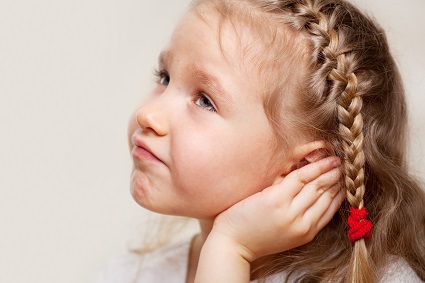EAR INFECTIONS
An ear infection, also called otitis media, is an infection of the middle ear (the air-filled space behind the eardrum). The infection causes inflammation that enables fluids to build up within the middle ear (acute otitis media), resulting in pain and hearing loss.
Over time, inflammation may subside and fluid may drain. Often, however, the ear retains fluid for months after inflammation has abated (serous otitis media), causing significant, prolonged hearing loss with little or no pain.
What causes ear infections?
When the Eustachian tube fails to function properly, normal drainage from the ear to the nasal passage is blocked. This allows bacterial and viral organisms—whether from cold, flu or allergies—to enter the middle ear. Children are often most susceptible to Eustachian tube dysfunction and, as a result, ear infections in general.
Symptoms of ear infections
How do you know if your child has an ear infection? Common symptoms of ear infections in kids include:
- Ear pain
- Pulling at the ear
- Fussiness
- Poor sleep
- Fluid drainage from the ear
- Problems with hearing or responding to sounds
- Loss of balance
- Fever of 100 F or higher
- Headache
Ear infection treatment
Often, the otitis media infection will clear up on its own. Close monitoring of symptoms and pain management may be all that's needed.
More severe cases, especially in infants, may require antibiotic medications. If fluid buildup and hearing loss persist or if infections recur with frequency, surgical placement of ventilation tubes may be required to prevent lasting hearing problems and other health complications.
How does a ventilation tube work?
A ventilation tube is placed in the eardrum to create an unblocked pathway out of the middle ear that allows fluid to drain, preventing the recurrence of buildup and infection.
Is tube placement surgery complicated?
No. For most children, the procedure can be performed on an outpatient basis, often in just a few minutes. Adults can receive treatment within their ENT physician’s office under a local anesthetic.
After-surgery care requires the simple use of antibiotic ear drops for a matter of days. Tubes typically fall out on their own within a year.
To learn more or to speak to one of our ENT specialists, request an appointment below or call 515-223-4368.

